Wagner and Kyiv make conflicting claims on control of eastern village

Peter Beaumont
Russian mercenary leader Yevgeny Prigozhin said forces of his Wagner group had captured the village of Yahidne, just north of Bakhmut in eastern Ukraine, on Saturday.
But Ukrainian military reports issued a day after the first anniversary of Russia’s invasion of Ukraine suggested that villages near the key town remained under Kyiv’s control.
Reuters could not independently confirm Prigozhin’s claim, made in a short audio message, or the report by the Ukrainian military’s general staff.
However, other sources reported that Russian forces had entered Yahidne as the situation around Bakhmut appeared to grow more perilous for its Ukrainian defenders.
Russian forces have been trying to take the now shattered Donbas city for seven months, inching forward at a glacial pace to try to encircle it with a narrowing corridor for Ukrainian defender.
According to accounts from the Bakhmut area, while Russian forces were bogged down to the south of the city, to the north they had advanced over a kilometre into the outskirts of Yahidne. Large assaults were also being reported to the south-west towards Ivanivske in the direction of the T0504 highway with the aim of cutting access to the city from the west.
Ukrainian troops in the town reported that the Russian tactic appeared to be the familiar one of throwing large groups of troops against their defences.
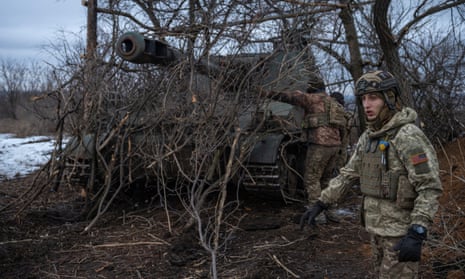
Commenting on the current Russian tactics last week, the UK’s Ministry of Defence said the Russians aim was to wear down Ukraine’s defences by sheer weight of numbers, even if that meant taking huge casualties.
Recent footage from Bakhmut showed Ukrainian armoured vehicles pouring autocannon and machine-gun fire into Russian positions.
With the situation in Bakhmut described as difficult, the head of Ukraine’s land forces, Oleksandr Syrskyi, visited the sector on Saturday to consult with commanders.
The Bakhmut sector is one of six areas where Russian forces have been expended increased effort in the past three weeks as part of a stepped-up offensive along the eastern front that has yet to produce any significant gains.
While western analysts suggest the capture of Bakhmut would be used as a propaganda victory by the Kremlin, many are sceptical that the city’s fall – and after so many losses – would offer a significant advantage.
Key events Show key events only Please turn on JavaScript to use this feature
Isobel Koshiw has filed this report on Ukrainian civilians regularly being caught up in poorly targeted Russian attacks:
Two Russian rockets hit a house on the outskirts of Kramatorsk, one of the main towns in the Ukrainian-controlled Donetsk region, on Saturday. The rockets appear to have missed their target, falling on the side of a local GP surgery, devastating the next door house as well as damaging houses around it.
A Guardian team on the scene assessed the rockets shells likely came from a Russian Smerch rocket launcher.
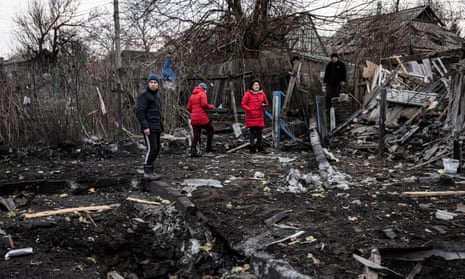
A woman in her 60s, who lived in the neighbouring house, was injured and quickly whisked away by an ambulance, according to eye-witnesses.
A neighbour who lived opposite and declined to give her name said:
She came out of her house screaming and then fell on the ground.
The impact of the rocket also tore down the electricity line, cutting power to the surrounding neighbourhood, according to neighbours who came out to see the devastation.
Poorly targeted attacks like these have been a regular occurrence for those living along the frontlines, particularly in Ukrainian-controlled Donetsk and Luhansk, where the fighting has been consistently heavy since the invasion started. Since the summer, Ukrainian officials have reported Russia using imprecise weapons in an attempt to hit Ukrainian military bases and equipment behind the frontlines which have resulted in a steady stream of civilian deaths.
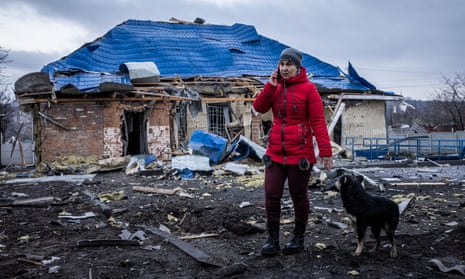
On 14 January, Russia launched an anti-ship missile, weighing a whopping 5,800kg, which hit and destroyed an entire section of an apartment block in the south-eastern Ukrainian city of Dnipro. At least 46 people died and dozens more were injured.
Oleksiy Yakovlenko, the head doctor at the main civilian hospital for the Donbas region, told the Guardian that the recent concentration of fighting in six areas of the region had led to a decrease in the number of civilian casualties but the numbers remain high.
If a month ago, we were receiving around 100s patients every day, now it’s in the dozens.
Finance chiefs of the world’s largest economies have strongly condemned Moscow for its war on Ukraine, with only China and Russia itself declining to sign a joint statement on Saturday.
India, which as chair of the Group of 20 economies was hosting a meeting in the city of Bengaluru, was reluctant to raise the issue of the war but western nations insisted they could not back any outcome that did not include a condemnation, Reuters reported.
The lack of consensus among G20 members meant India resorted to issuing a “chair’s summary and outcome document” in which it simply summed up the two days of talks and noted disagreements.
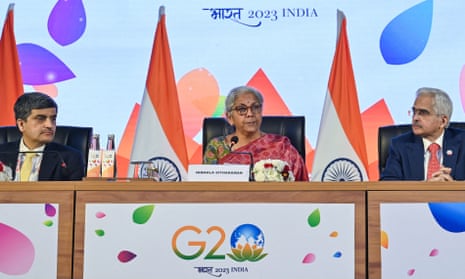
Most members strongly condemned the war in Ukraine and stressed that it is causing immense human suffering and exacerbating existing fragilities in the global economy,” it said, citing disruption of supply chains, risks to financial stability and continuing energy and food insecurity.
“There were other views and different assessments of the situation and sanctions,” it said, referring to measures put in place by the United States, European countries and others to punish Russia for the invasion and to starve it of revenues.
The outcome was similar to that of a G20 summit in Bali last November when host Indonesia also issued a final declaration acknowledging differences.
Wagner and Kyiv make conflicting claims on control of eastern village

Peter Beaumont
Russian mercenary leader Yevgeny Prigozhin said forces of his Wagner group had captured the village of Yahidne, just north of Bakhmut in eastern Ukraine, on Saturday.
But Ukrainian military reports issued a day after the first anniversary of Russia’s invasion of Ukraine suggested that villages near the key town remained under Kyiv’s control.
Reuters could not independently confirm Prigozhin’s claim, made in a short audio message, or the report by the Ukrainian military’s general staff.
However, other sources reported that Russian forces had entered Yahidne as the situation around Bakhmut appeared to grow more perilous for its Ukrainian defenders.
Russian forces have been trying to take the now shattered Donbas city for seven months, inching forward at a glacial pace to try to encircle it with a narrowing corridor for Ukrainian defender.
According to accounts from the Bakhmut area, while Russian forces were bogged down to the south of the city, to the north they had advanced over a kilometre into the outskirts of Yahidne. Large assaults were also being reported to the south-west towards Ivanivske in the direction of the T0504 highway with the aim of cutting access to the city from the west.
Ukrainian troops in the town reported that the Russian tactic appeared to be the familiar one of throwing large groups of troops against their defences.

Commenting on the current Russian tactics last week, the UK’s Ministry of Defence said the Russians aim was to wear down Ukraine’s defences by sheer weight of numbers, even if that meant taking huge casualties.
Recent footage from Bakhmut showed Ukrainian armoured vehicles pouring autocannon and machine-gun fire into Russian positions.
With the situation in Bakhmut described as difficult, the head of Ukraine’s land forces, Oleksandr Syrskyi, visited the sector on Saturday to consult with commanders.
The Bakhmut sector is one of six areas where Russian forces have been expended increased effort in the past three weeks as part of a stepped-up offensive along the eastern front that has yet to produce any significant gains.
While western analysts suggest the capture of Bakhmut would be used as a propaganda victory by the Kremlin, many are sceptical that the city’s fall – and after so many losses – would offer a significant advantage.
Opening summary
Hello and welcome back to our live coverage of Russia’s war in Ukraine. This is Adam Fulton bringing you the latest developments.
Yevgeny Prigozhini says his Wagner mercenary group has captured the eastern Ukrainian village of Yahidne, near the fiercely contested city of Bakhmut.
However, Ukrainian military reports issued on Saturday suggested villages near the key town remained under Kyiv’s control.
Reuters reported it could not independently confirm Prigozhin’s claim or the report of the Ukrainian military’s general staff.
A day earlier, Prigozhin said Wagner had taken control of Berkhivka, an adjacent village on the outskirts of Bakhmut.
More on this story soon.
In other key developments as it approaches 9am in Kyiv.
Ukraine’s energy minister says the country has been able to amass some power reserves and that there will be no more outages to ration electricity if there are no new Russian strikes, after months of power cuts.
Thousands of people have taken part in a demonstration in central Berlin to protest against giving more weapons to Ukraine, urging the German government to instead pave the way for negotiations with Vladimir Putin. In London, Marina Litvinenko – the widow of a defector poisoned in London – led calls for a Ukrainian victory in the war at a demonstration of several hundred outside the Russian embassy.
A meeting of finance chiefs of the Group of 20 leading economies has ended without a consensus, with Russia and China objecting to the description of the war in Ukraine in a final document. In a statement at the end of the meeting in Bengaluru, the G20 chair, India, said a statement demanding Russia’s withdrawal from Ukraine was endorsed by all members except Moscow and Beijing.
The French president has said China’s engagement in peace in Ukraine is a “good thing”. Emmanuel Macron told reporters he would visit China in early April, in part to seek Beijing’s help with ending the war. “China must help us put pressure on Russia so that it never uses chemical or nuclear weapons,” he said.
The US has intelligence that the Chinese government is considering providing Russia with drones and ammunition for use in the war in Ukraine, according to US officials. They said it did not appear Beijing had made a final decision yet, CNN reported, but Russia-China negotiations about the price and scope of the equipment were ongoing.
Poland’s largest oil company, PKN Orlen, has stopped receiving oil via the Druzhba pipeline from Russia, its CEO, Daniel Obajtek, has said. Orlen said it could fully supply its refineries via sea and that consumers would not be affected by the halt. Russian oil accounts for about 10% of Polish supply.
Explosions have reportedly been heard in the Russian-occupied city of Mariupol in southern Ukraine, according to Petro Andriushchenko, an adviser to the city’s exiled mayor. The explosions were reported in the location of a large Russian military personnel cluster, he said, adding: “It’s a good trend.” Ukraine’s armed forces have in recent days claimed strikes on Mariupol, previously thought to be outside the effective range of Ukrainian missiles.
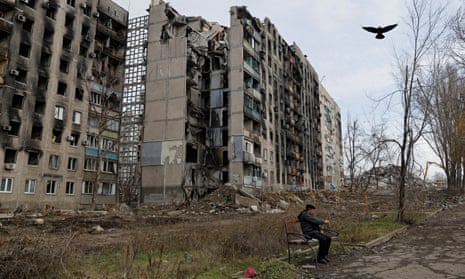
Mykhailo Podolyak, a senior adviser to Volodymyr Zelenskiy, has dismissed as “unrealistic” China’s proposal to end the conflict. Podolyak posted on Twitter that Beijing should not “bet on an aggressor who broke [international] law and will lose the war”. President Zelenskiy has cautiously welcomed China’s 12-point proposal to end Russia’s invasion of Ukraine but said it would be acceptable only if it led to Vladimir Putin pulling his troops out from all occupied Ukrainian territory.
Russia appears to have run out of its current stock of Iranian-made drones and will seek to resupply, the UK Ministry of Defence’s latest update says. Russia most likely saw the drones as “useful decoys which can divert Ukrainian air defences from more effective Russian cruise missiles”, it said.
The European Union has agreed to impose a 10th package of sanctions on Russia in response to its invasion of Ukraine, just in time for a self-imposed deadline to mark the first anniversary of the war. The latest round of sanctions tackled the banking sector, advanced technologies and Russia’s access to technology that could be used for civilian and military purposes, said the EU’s top diplomat, Josep Borrell.
Joe Biden has ruled out “for now” sending American advanced fighter jets to Ukraine, saying Ukraine ’s President Volodymyr Zelenskiy “doesn’t need F-16s now”. The US president told the American Broadcasting Company “there is no basis upon which there is a rationale, according to our military now, to provide F-16s” to Ukraine.
The Belarus president, Alexander Lukashenko, said he and Vladimir Putin spoke for a long time on Friday. Lukashenko’s remarks to reporters came as China’s foreign ministry confirmed he is expected to visit China on Tuesday.
A former commander of Russia’s Wagner mercenary group has been arrested after allegedly attacking a police officer in Oslo, according to Norwegian prosecutors. Andrey Medvedev, who has been living in Norway in January since he fled from Russia, was allegedly detained in the early hours of Wednesday after a fight outside a bar in the Norwegian capital.
Thousands of tickets for the Eurovision song contest are to be allocated to Ukrainians who have been forced from their homes and are living in the UK. The UK government also announced £10m in funding to “help ensure the event truly howcases Ukrainian culture”.

 1 year ago
260
1 year ago
260










 English (US)
English (US)